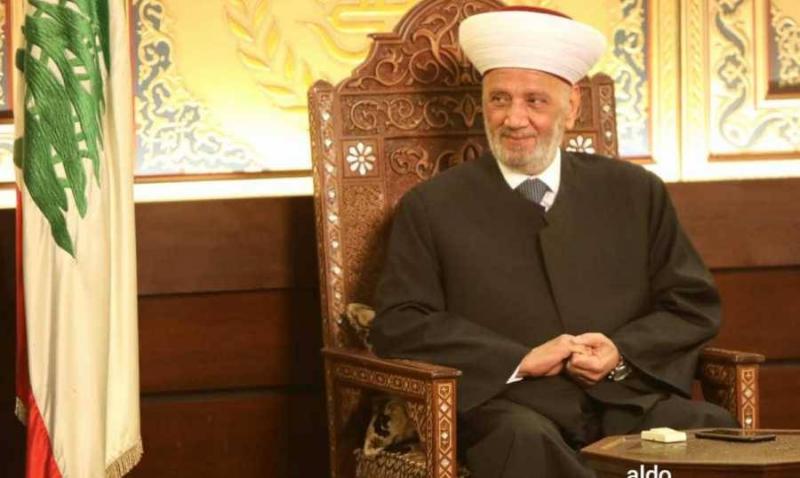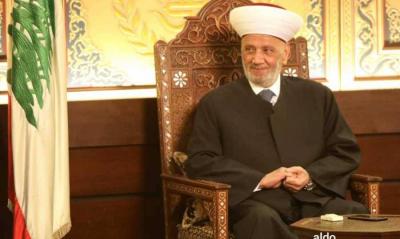The State Council received a response from the lawyer of the Grand Mufti of the Republic, Sheikh Abdul Latif Deryan, addressing a challenge to his extension submitted by five sheikhs. The Fatwa Office argued that the Council is not the appropriate body to review the case, as its decisions are akin to legislative texts and fall under the jurisdiction of the Constitutional Council, according to "Al-Akhbar".
Before the legal deadline (four months) for the Fatwa Office to respond to the review presented by the five sheikhs to the State Council challenging the decision of the Higher Islamic Sharia Council to extend the terms of Grand Mufti Sheikh Abdul Latif Deryan and the regional muftis on September 9, a former head of the Bar Association in the north, Mohammad al-Mirad, acting on behalf of Deryan, submitted a response to the Council, requesting the rejection of the review for lack of jurisdiction, arguing that the texts issued by the sectarian authorities are legislative in nature and therefore subject to the Constitutional Council, not the State Council.
Notably, the lawyer representing the Fatwa Office, which had previously refrained from providing documents related to the extension session to the requesting party, did not delve into the details of the case or provide additional documentation regarding the extension session. The appellants (Judges Abdul Aziz Al-Shafei, Hamam Al-Shaar, and sheikhs Jamil Al-Aytani, Mohammed Tamim, and Ibrahim Baydoun) relied on official statements issued by the Fatwa Office to refute the legal gaps in the extension session, including the invalidation of the session due to the lack of a quorum (26 members present and 12 absent) and the absence of votes by a show of hands or in writing, thus questioning the legality of the resultant decisions, in addition to overstepping authority by legislating regulations outside the legislative session and discussing the agenda via WhatsApp, contrary to legal norms.
The appellants decided to resort to the State Council as the appropriate body based on Clause 2 of Article 108 of the State Council Law, which requires the annulment of decisions tainted by administrative violations if taken contrary to the substantive transactions stipulated in laws and regulations, pointing to the characterization of the contested decision and its subjection to judicial review and the jurisdiction of the State Council over legislative decrees, as the measures taken by the Sharia Council are administrative acts under Articles 67 and 105 of the State Council system, which can be contested by annulment.
In the response, Al-Mirad called on the Council to reject the review for lack of jurisdiction, considering the review a challenge to texts that hold the force of law under Law 1956, and in line with Article 105 of the State Council system. He noted that Decree 18/1955 (which regulates the affairs of the Fatwa Office) was issued based on the law passed in 1956 and falls within the framework of the delegation granted by the legislative authority to the Sharia Council, asserting that the consideration of texts with a legislative nature is outside the jurisdiction of the State Council, given that the Constitutional Council oversees the constitutionality of laws and texts that have the force of law, including those issued by sectarian authorities such as those from the Sharia Council under Law 1946.
Al-Mirad argued that the contested decision (the extension) was based on the law issued on 28/5/1956, which authorizes the Sharia Council to amend Legislative Decree No. 18/1955, allowing the council to review all provisions of the aforementioned decree and modify those it deems necessary, with its decisions in this regard and all that pertains to fatwas and the organization of the religious sect and the management of its endowments being valid in themselves, provided they do not conflict with the provisions of laws related to public order.
The response referenced amendments made by the council over the years, the latest being in 2020, and legal and constitutional provisions emphasizing that Sunni Muslims are completely independent in their religious affairs and charitable endowments for which they legislate their systems. It also included studies prepared by various legal references, including published articles by judges Khaled Qabbani, Antoine Masrah, and Pierre Ghnaja, and a book published in 1973 by Edmond Rabat stating that the most important and critical aspect of the basic law pertaining to the Sunni sect is its ability to amend this law at will without resorting to the state for approval.
### Independence of the Religious Institution?
The summary of the response, as clarified by Al-Mirad to "Al-Akhbar," indicates that amending one of the articles of Decree 18 through the extension of the term of the Grand Mufti and regional muftis is not an administrative decision but a legislative matter after laws granted Sharia Council decisions a status that does not rise to that of law but to that of a legislative text, with oversight of these texts falling under the Constitutional Council's jurisdiction. This is also confirmed by university professor specialized in constitutional law and the history of political thought, Wissam Al-Lahham, who indicated that Law 25/5/1956 granted the authority responsible for managing Sunni sect affairs the power to amend the legislative decree without referring to the Parliament, effectively granting it legislative delegation.
Al-Lahham supports Al-Mirad's theory regarding the Sharia Council's powers, asserting that its decisions should not be regarded as administrative decisions. However, he notes that it is within the Council's authority to examine the form of the decision, regardless of the legislative delegation granted to the Sharia Council, if any formal flaws in the legal mechanism of decision-making are apparent, such as the loss of quorum and majority.
Notably, the response contained a statement issued by the Sharia judges in Sunni Sharia courts regarding the rejection of the extension challenge, as it is a binding approval affirming the Sharia Council's powers and the judges' intent not to relinquish them, showing consensus on the extension decision. It is worth noting that accusations arose around the time regarding Deryan and Chief Judge Sheikh Muhammad Assaf exerting pressure on the judges to sign the statement, with some being threatened with transfer to remote locations if they did not sign.
### Will the State Respond?
In conclusion, both parties are awaiting the Council's decision, which has yet to appoint a rapporteur to consider the case. The Council is also expected to receive a response from the requesting party regarding the response, in addition to a reply from the Lebanese state - the Presidency of the Council of Ministers represented by the Legal Affairs Authority in the Ministry of Justice as the opposing party. However, it remains unclear whether the state will respond as the legal deadline approaches, amid rumors of Prime Minister Najib Mikati's refusal to intervene in the crisis, as the mufti and his close associates did not inform him of their extension plan, leading to his absence from the extension session, similar to previous prime ministers who objected for the same reason.
### Double Standards Between Deryan and Qabbani
The response submitted by lawyer Mohammad Al-Mirad, representing the Grand Mufti, to the State Council regarding the challenge to Deryan's extension revealed double standards among some legal figures. During the peak of the dispute between former Grand Mufti Sheikh Mohammed Rachid Qabbani and the Sharia Council, the State Council was one of the key weapons used against Qabbani's opponents, especially Al-Mirad, who mentioned one of the Council's decisions during a press interview at the time, considering it established a fundamental principle concerning judicial review of administrative and organizational decisions of the Fatwa Office as a public institution affiliated with the Presidency of the Council of Ministers. Al-Mirad was also among those who filed a legal opinion on behalf of 21 State Council members to challenge Qabbani's invitation to hold Sharia Council elections, in which Deryan was one of those 21 members. Al-Mirad also participated in the lawsuit filed against the former director-general of Islamic endowments Sheikh Hisham Khalifa before the public prosecution for several offenses, including deliberately issuing decisions and positions to imply that the legal decisions issued by the State Council are non-binding.
As a result of this double standard, Qabbani recently distributed a statement on WhatsApp, recalling that period and pointing to pressure from prime ministers on the Council at the time to annul the mufti's decisions. In contrast, Al-Mirad asserts that the two periods are entirely different, noting that recourse to the Council at that time was to challenge purely administrative decisions regarding appointments issued by the Grand Mufti, and not regarding legislation issued by the Sharia Council, according to "Al-Akhbar."




